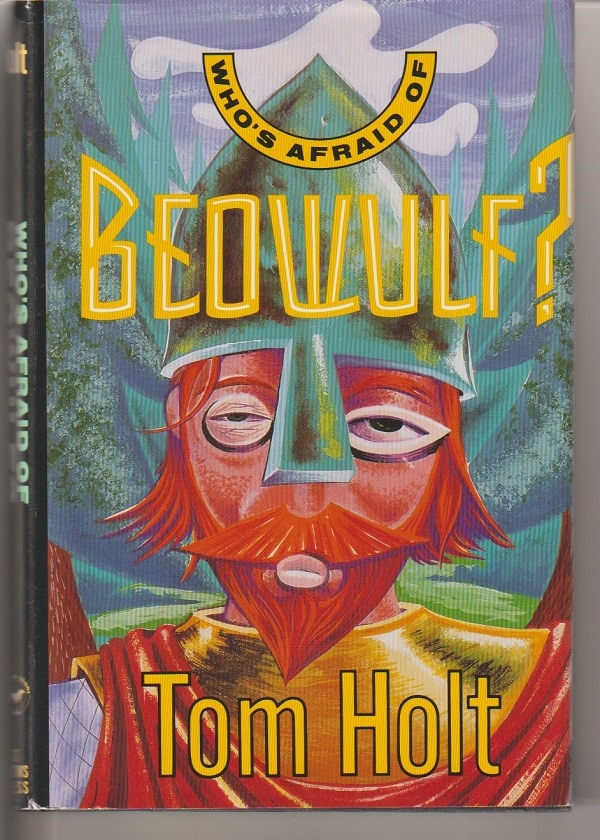Actually, Beowulf isn’t a character in Tom Holt’s 1988 comic novel Who’s Afraid of Beowulf? (although that is, of course, a fun title). He’s not even mentioned until a few pages from the end.
One of the dozen of his Norse contemporaries who show up in late 20th century Scotland and cause a great deal of consternation for the citizenry as well as for one particularly interested sorcerer-king is growing philosophical about leading a life that results in sagas.
“What are the deeds of heroes, except a few frightened people doing the best they can in the circumstances? Sigurd had no trouble at all killing the dragon; it was a very old dragon, and its eyesight was starting to go…
“Or take Beowulf. Weedy little bloke, got sand kicked in his face on the beach as often as not. But he just happened to be in the right place at the right time.”
This comes after the Norse warriors, asleep for more than twelve hundred years, have been awakened to do battle with that sorcerer-king, now an international powerhouse, whom they’d vanquished in battle lo those many centuries ago. In their small war, they are aided by a couple of hapless moderns — Danny Bennett, a BBC reporter of mediocre abilities who becomes a kind of mascot for them, and Hildy Fredericksen, a neophyte archeologist who becomes their link to present-day life.
“The Norse word”
Diminutive and unprepossessing, cursed with “commonplace features,” Hildy becomes so much one of the heroic band that she is given her own hero name — Vel-Hilda.
“The Norse word vel, as you know better than I,” King Hrolf explains, “is short and means ‘well.’ The same may be said of you.” Hildy thinks that it’s accurate but not much of a compliment.
“Short and means well. True. Very true.”
Nonetheless, at a key moment in the final Armageddon-like battle, the one who saves the day is Hildy.
Yes, a frightened person doing the best she can.
Like a World War II squad
Who’s Afraid of Beowulf? is the second of more than a dozen short novels, published between 1987 and 1999, in which Holt, a prolific British author, inserts figures from various mythologies into the modern world with intent to commit comedy.
Some of the legends Holt’s mined are the story of the Flying Dutchman, the quest for the Holy Grail, the labors of Hercules, the djinn from Arabian Nights, Faust’s bargain and the Grimm fairy tales. If Who’s Afraid of Beowulf? is representative, he’s not so much retelling these stories but hijacking characters.
In this novel, the twelve Norsemen, under King Hrolf, are presented as heroes in the same way that a World War II movie portrays a squad of American soldiers — a mix of personalities who have their human quirks and sometimes get on each other’s nerves but know that, when the time comes, they will bond together as a team to face their foe.

In this case, the foe, the sorcerer-king whose name, pretty mundane, isn’t revealed until near the novel’s end, is pretty powerful, more powerful than he was back in the 700s because now he’s backed by modern technology.
Hrolf, Hildy and the others, though, have their own secret weapons — magic, which bears a lot of resemblance to technology.
“A small, learned terrier”
Holt’s writing is light and amiable. Some of his phrasing is particularly felicitous, such as when he describes Hildy deciding to climb down into the whole in which Hrolf’s ship (and the 12 men) have been found.
[She] took a deep breath, and plunged into the hole like a small, learned terrier.
When Hildy goes out to buy identical gray suits for the Norsemen to help them blend into the modern world (as long as they leave off their helmets), Holt writes:
By and large, the heroes seemed pleased with their new clothes — except of course for Brynjolf the Shape-Changer. He had taken one look at his suit and changed himself into an exact facsimile of himself wearing a similar suit, only with slightly narrower lapels and an extra button on the cuffs.
The King’s suit, of course, fitted perfectly.
“Wanted to be a fisherman”
Hildy is British, and so, in an ancient way, is Hrolf. Thus, although they do seem to be dancing throughout the novel around an attraction to each other, nothing is said or done.
Nonetheless, toward the end, they are talking before the battle that will settle everything — including their fates. The King says, “When I was a little boy, I wanted to be a fisherman.” To which Hildy responds:
“When I was a little girl, I wanted to be a Viking. It’s been fun, but not in the way I thought it would be. If we do get killed, will we go to Valhalla, across the Rainbow Bridge?”
By the end of the novel, Hildy and Hrolf still haven’t said or done anything about, you know.
Nonetheless, as they separate, as, of course, they have to, they make a date — to meet in Valhalla in sixty years or so.
Patrick T. Reardon
2.11.21
Written by : Patrick T. Reardon
For more than three decades Patrick T. Reardon was an urban affairs writer, a feature writer, a columnist, and an editor for the Chicago Tribune. In 2000 he was one of a team of 50 staff members who won a Pulitzer Prize for explanatory reporting. Now a freelance writer and poet, he has contributed chapters to several books and is the author of Faith Stripped to Its Essence. His website is https://patricktreardon.com/.
